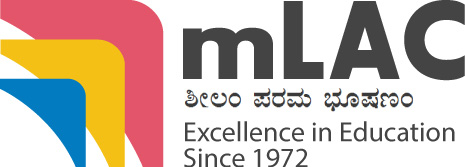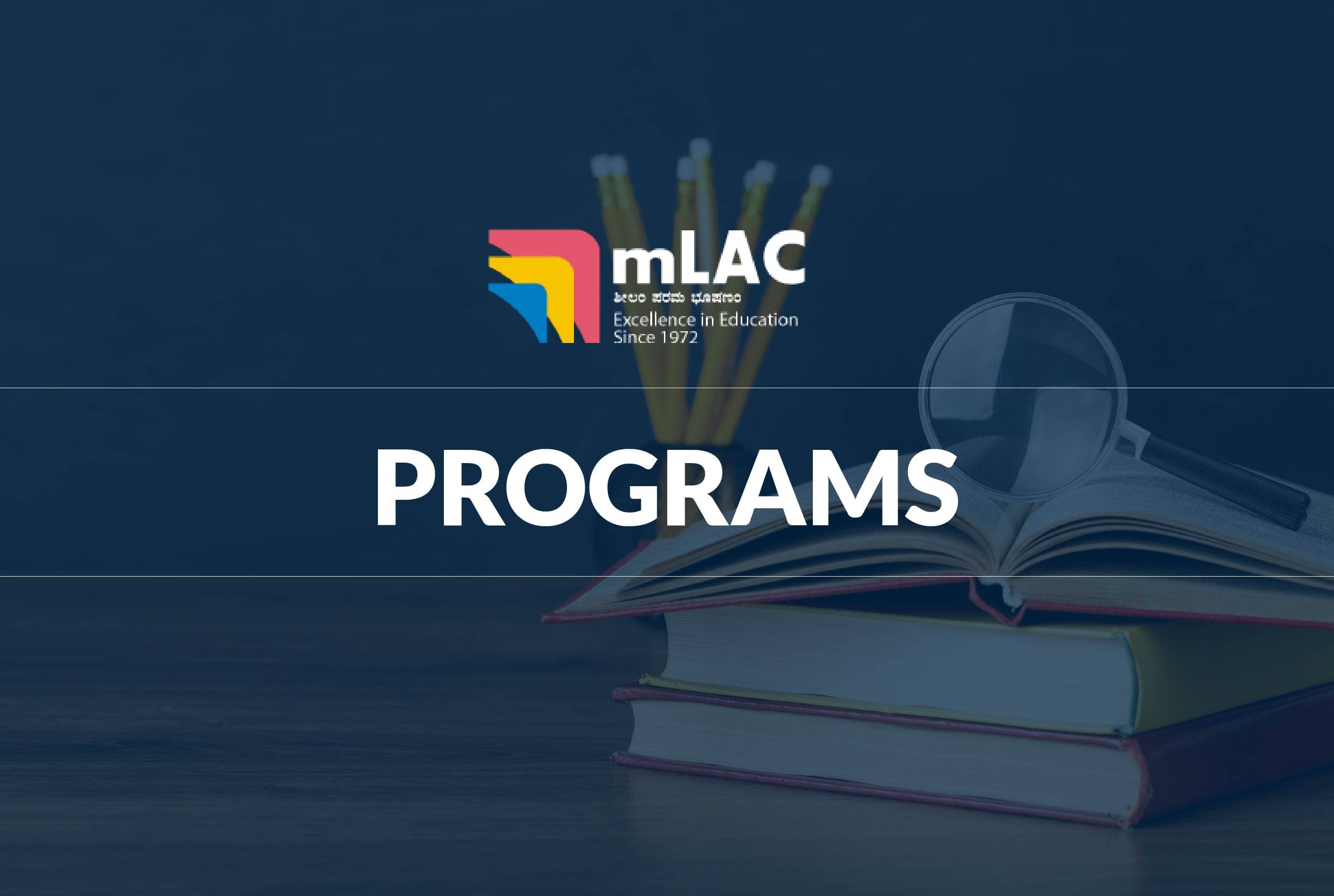MLACW (now mLAC) is an institution of excellence located strategically in the vicinity of national institutes of repute, such as Indian Institute of Science, Institute of Wood Science & Technology, National Institute of Advanced Studies, Raman Research Institute and Central Power Research Institute.

About
Department of EnglishVISION OF THE DEPARTMENT
To equip the students with knowledge of English Language as a means of communication and a weapon to face the challenges of the ever-changing global scenario.
MISSION OF THE DEPARTMENT
- Creating a learning experience that encourages and facilitates creative and literary skills.
- Inculcating leadership qualities and team spirit wherein they can translate and channelize their ideas and knowledge to make a distinct difference in the world.
- Instilling the art of communication in the young minds and preparing them for the global environment.
Overview
English is perhaps the most spoken language in the world. As a medium of communication, India has taken to it in a big way since the colonial days. We have enjoyed a distinctive advantage through the fluency that we have historically acquired. Deeper appreciation of the beauty of the language and its myriad nuances can help in the blooming of a new breed of writers, poets and media personalities.
The Department of English was incepted along with the college in the year 1972. The Department has a rich tradition of nurturing some of the finest talent. mLAC is committed to sustaining the glorious tradition of arts and in particular the languages. We believe we have a role to play in helping sustain the quality of literature in the English language by creating young people trained in this area. Our dedicated faculty, a well-stocked department library and vigorous academic processes ensure that there is a vibrant exchange of knowledge in this celebrated field.
OBJECTIVES
- To implement teaching methods which expands and develops their presentation as well as writing skills.
- To focus on the importance of functional skills of English language to excel in managerial skills.
- To create an environment that ignites and inspires love for the language.
COURSES OFFERED:
General English/ Generic English: (1979)
The Department of English offers General English to the first, second, third and fourth semester students pursuing BA, BSc, B Com, BCA and BBA.
The General English syllabus is designed to cater to the demands imposed by the current world on its youth. The literary pieces selected for study highlight the contributions of scientists, environmentalists, thinkers and thereby sensitize young minds to the vital dimensions of their cultural existence in multilingual and cross-cultural domains. If some units awaken the social conscience of caste, gender and racial segregation, some stress on the need to preserve this pristine planet for the future generations.
The workbook is designed to train students along with remedial grammar in all the four skills of speaking, reading, writing and listening.
Additional English:
mLAC (Autonomous) under the auspices of Bangalore University offers the Additional English paper to students as an alternative to Kannada, Hindi or Sanskrit language papers. The textbook caters to the multi-lingual and ethnic diversities of students.
B A - Optional English: (2022)
The course aims to provide students with a strong foundation in the history and development of English literature. The chosen literary pieces aims at developing creative, analytical, argumentative and evaluative skills.
Open Electives: (2021)
Under NEP the department of English offers open elective papers to foster language and literary sensibilities of the students.
Sem I : 1. Functiional English Grammar and Study Skills. 2. Critical thinking and Creative Writing- I (short Story)
Sem II: 1. Spoken English for Corporate Jobs 2. Critical thinking and Creative Writing- II (Poem)
Sem III: 1. Public Speaking and Public Relations 2. Critical thinking and Creative Writing- III (Play)
Sem IV: 1. English for Competitive Exams 2. Critical thinking and Creative Writing- IV (Film Criticism)
Communicative Add on Course: (2012)
mLAC is equipped with a Language Lab that addresses faulty language habits and offers one-on-one attention to students and helps improve their language through ‘Communicative English’, an add-on course.
The course focuses on developing macro and micro English language skills such as listening, speaking, reading, and writing skills including vocabulary and grammar. The course branches into 3 levels with a course duration of 160 hrs each.
- Level I: Certificate Course
- Level 2: Basic Diploma Course
- Level 3: Advanced Diploma Course
Syllabus
| Title | Year | Download |
|---|---|---|
| English NEP syllabus | 24 Jan, 2024 | Download |
| Certificate Course in Communicative English | 06 Jun, 2016 | Download |
| Additional English 2020-21 | 04 Jun, 2020 | Download |
| Communicative English - Diploma | 06 Jun, 2016 | Download |
| Generic English NEP Syllabus 2021 - Onwards | 01 Aug, 2021 | Download |
| Optional English | 08 Sep, 2022 | Download |
| Communicative English (Add-on Course) | 08 Sep, 2022 | Download |
| General English BSC/BCA 2016-18 | 01 Jun, 2016 | Download |
| General English Syllabus B.A 2016-18 | 06 Oct, 2016 | Download |
| General English Syllabus BBA/BBM 2016-18 | 01 Jun, 2016 | Download |
| Generic English Syllabus B.Com 2016-18 | 01 Jun, 2016 | Download |
| General English 2018-2021 | 04 Jun, 2019 | Download |
| English NEP Syllabus | 06 Jan, 2024 | Download |
Course Outcome
PROGRAMME OUTCOMES AND COURSE OUTCOMES
GENERAL ENGLISH
PROGRAMME OUTCOMES:
-
Critical Thinking: Enabling students to read, analyze, and interpret works of literature and develop a sense of appreciation for the aesthetics and to exercise their ability to think clearly and cogently.
-
Cultural Integration: Aware of the importance of the coexistence of different cultural perspectives will be inculcated. The students will become more tolerant to views different from their own.Improvement in the ability to reason and think critically and develop a sense of appreciation for the aesthetics.
-
Skill development: Improvement of LSRW skills -- through discussion, seminars and written work. Inculcation of the skills of interpretation, analysis, appreciation of literature as well as writing and presentation skills that would eventually help in careers like journalism and media, publishing, research and teaching.
-
Social Interaction: The students will be able to respond appropriately in discussion, interrupt politely, state their views clearly and accept differences in opinion amicably.
-
Values and Ethics: Empowerment of students to use their study of literature to initiate cultural, ethical, and global awareness.The students are also empowered to use their sources with proper acknowledgement and shun plagiarism.
-
Self-directed and Lifelong Learning: Assist students in the development of intellectual flexibility, creativity, and cultural literacy so that they may engage in life-long learning.
Outcomes:
-
Students should be able to identify, analyze, interpret and describe the critical ideas, values, and themes that appear in literary texts and understand the way these ideas, values, and themes inform and impact culture, society and individuals both now and in the past.
-
Students should be able to understand the process of communicating and interpreting human experiences through literary representation.
-
Students should be able to ethically gather, understand, evaluate and synthesize information from a variety of written and electronic sources.
-
students should be able to develop the abilities in grammar, oral skills, reading, writing and study skills.
-
Students should be able to write in a variety of formats, including summaries, essays, reports, research papers, reflective writing and critical reviews of secondary sources.
-
Students should be able to presents their ideas and knowledge using powerpoint presentations
English Course Outcome :
Semester I
Literary component:
-
To develop love for language and literature - various literary works which helps in sensitising the students on various burning issues which the world is facing today and which helps to inculcate the values of equality, humanitarianism and love for nature are read and analysed.
-
Reading Prose ( Literary text and extended reading which includes biographies, letters, essays, short stories, travelogue, one act play, Drama, novella etc) To develop critical thinking in students
-
To enable them to write and appreciate different types of prose
Workbook Component:
To develop Language competency( LSRW)- Vocabulary building components, remedial grammar components, Speaking skills, reading components, writing skills( paragraph (descriptive, narrative, reflective and persuasive), essay writing, letter writing are taught and practiced.
Semester II
Literary component:
-
To develop love for language and literature - various literary works which helps in sensitising the students on various burning issues which the world is facing today and which helps to inculcate the values of equality, humanitarianism and love for nature are read and analysed.
-
Reading Prose (Literary text and extended reading which includes biographies, letters, essays, short stories, travelogue, one act play, Drama, novella etc) To develop critical thinking in students
-
To enable them to write and appreciate different types of prose
Workbook Component:
To develop Language competency(LSRW)- Vocabulary building components, remedial grammar components, Speaking skills (telephonic conversation- enquiries / placing orders / complaint), reading components, writing skills( paragraph (descriptive, narrative, reflective and persuasive), essay writing, drafting classified advertisements, corresponding through Email are taught and practiced.
Semester III
Literary component:
-
To develop love for language and literature - various literary works which helps in sensitising the students on various burning issues which the world is facing today and which helps to inculcate the values of equality, humanitarianism and love for nature are read and analysed.
-
Reading Prose (Literary text and extended reading which includes biographies, letters, essays, short stories, travelogue, one act play, Drama, novella etc) To develop critical thinking in students
-
To enable them to write and appreciate different types of prose
Workbook Component:
To develop Language competency(LSRW)- Students are taught Nonverbal communication, Note making / taking , Summarising, Writing Newspaper reports, Status reports, Survey reports etc.
Semester IV
Literary component:
-
To develop love for language and literature - Anthology of poems and Drama are read and analysed
-
Reading Prose (Literary text and extended reading which includes biographies, letters, essays, short stories, travelogue, one act play, Drama, novella etc) To develop critical thinking in students
-
To enable them to write and appreciate different types of prose
Workbook Component:
To develop Language competency(LSRW)- Students are taught Presentation skills (The students are expected to create PowerPoint presentations on any topic related to language and literature incorporating extensively researched web sources). Job skills ( resume writing, interview skills, Group discussion, conducting interview etc.), Writing academic essays (synopsis, abstract, research article), Referencing skills project assignments are taught and practiced.
COMMUNICATIVE ENGLISH- BVOC MLT
PROGRAMME SPECIFIC OUTCOMES AND COURSE OUTCOMES
PROGRAMME SPECIFIC OUTCOMES
-
Helps students to seek and find employment in the corporate, media, labs and other fields. The students are exposed to the employment challenges and job roles and promote the students to establish self-employment strategies.
-
Development of communicative competence in students.
-
Enhanced knowledge, ideas and concepts in the technicalities of proper pronunciation, structure, appropriate use and style of the English Language as well as the application areas of English communication.
-
Enrich the learner’s communication skills by giving adequate exposure in listening, speaking, reading and writing skills and the related sub-skills and help the learners recognize and operate in various styles and registers in English.
-
The learners get rid of present flaws and mistakes in grammar which helps in gaining fluency in English. The learners are also encouraged to identify and correct the voids in present vocabulary targeting those specific arrays of words which create a barrier in his thought process.
-
Better writing skills by sensitizing the learners to the dynamics of effective writing.
-
Building confidence in oral and interpersonal communication by reinforcing the basics of pronunciation, especially focusing on interviews / corporate meetings / international business travels.
-
Enabling the learner to achieve adequate linguistic skills to help them compete in international certification tests of English such as TOFEL, GRE, IELTS etc.
COURSE OUTCOMES
SEMESTER I
-
To develop an understanding of the importance of communication in daily as well as professional life.
-
To overcome the barriers of listening skills as units focuses on verbal mannerisms and physical inabilities and active listening.
-
To build fluency in speaking through enhancing pronunciation, word stress and intonation.
-
To train the students in reading techniques-Skimming and scanning.
-
To help them form correct sentences and improve basic writing skills- Paragraph and essay writing.
SEMESTER II
-
To help the students grasp the important information from a lecture through note-making.
-
To enhance the reading skills through comprehending scientific journals.
-
To improve job and interview skills through real life communication task.
-
To help the students be proficient in technical writing.
SEMESTER III
-
To enlighten the students about the importance of interpersonal communication in a professional environment.
-
To build a skill of listening and analysing discussions and speeches.
-
To build confidence while conversing in professional scenarios – Situational conversations and presenting papers.
-
To analyze different types of papers and apply the techniques of reading.
-
To filter out common grammatical errors in daily speaking and writing exercises.
SEMESTER IV
-
To raise awareness about multicultural communication.
-
Job Specific listening skills – Health care related talks and interviews.
-
To enhance public speaking and presentation skills.
-
To comprehend product information for specific purposes.
-
To improve official writing skills – Email writing and sales emails.
Additional English - BA/ B.COM/ B.SC/BBA/BCA
Programme Specific Outcomes
-
To introduce Indian regional writings.
-
To understand the salient aspects of the study of various regional ethos.
-
To put forward the need to absorb the diversity of cultures.
-
To foster and develop a greater holistic perspective of culture, growing out of one’s local cocoon.
-
To develop critical thinking skills among the students by reading and analyzing the literary pieces from different perspectives.
-
To help students learn values and ethics through the characters in the stories.
-
To enable students to appreciate the poetry and literary pieces in the syllabus.
-
To sharpen language skills such as reading and writing.
-
To enhance the right usage of vocabulary.
-
To enlighten students about social issues.
-
To enhance the comprehension and analytical skills.
COURSE OUTCOMES
Semester 1
Literary component:
-
To introduce different Indian regional writings: poems and short stories by different regional writers prescribed in the syllabus enlighten students and integrate them with the different cultures and regional ethos.
-
To sensitise students towards the environment and inculcate universal values and principles among them.
Workbook component:
-
To develop language skills among the students: vocabulary building, development of writing and comprehending skills.
Semester 2
Literary Component:
-
To generate humane values among the students: short stories prescribed in the syllabus talk about values/principles like dignity of labour and sensitisation towards the environment.
-
To enlighten students about the social issues: gender stereotypes and inequality, animal sacrifice as a ritual, corruption and hypocrisy in the bureaucratic system.
Workbook component:
-
To develop language skills among the students: students develop advertisement writing skills creatively, learn to analyse and interpret a particular picture, and improve conversation skills.
Semester 3
Literary component:
-
To introduce students with Pan-Asian literary pieces: The topics introduced in the syllabus help students to learn and appreciate different cultures across the world.
-
To sensitise students towards the social concerns: short stories displaying racial discrimination bring awareness among the students regarding the historical situations (racial tensions in post-war American society.)
Workbook section:
-
To develop writing skills: Caption writing and Leaflet writing help the students to develop creative writing skills.
-
To enhance the comprehension and analytical skills: The topics like giving instructions and Information transfer enable students to develop their comprehension and analytical skills.
Semester 4
Literary component:
-
To develop love for language and literature - various literary works which helps in sensitising the students on various burning issues which the world is facing today and which helps to inculcate the values of equality, humanitarianism and love for nature are read and analysed.
-
To enable students to appreciate the poetry and literary pieces in the syllabus.
Workbook component:
-
To develop the writing skills among the students: Different topics in the workbook section help in the improvement of writing skills among the students.
Reports
| Title | Year | Download |
|---|---|---|
| Elocution Competition | 05 Oct, 2018 | Download |
| Workshop - First Step | 10 Jan, 2019 | Download |
| Competition- Crossword | 04 Oct, 2019 | Download |
| Bridge Course | 14 Jun, 2018 | Download |
| Split Class | 03 Jul, 2018 | Download |
| Guest Lecture - Academic Writing in Language and Literature | 03 Apr, 2021 | Download |
| Guest Lecture - Drama 'Where tThere is a Will' | 14 May, 2021 | Download |
| FDP - NEP for language- English | 18 Oct, 2021 | Download |
| Lecture Series - Literary Regale 1 | 06 Feb, 2022 | Download |
| Lecture Series - Literay Regale 2 | 05 May, 2022 | Download |
| Competition - Jumble-Tumble | 12 Jul, 2022 | Download |
| Inauguration of Language and Literary Club 'Literary Mavens' | 08 Sep, 2022 | Download |
| Competition - Sherlock Bones | 12 Nov, 2022 | Download |
| Versify | 29 Nov, 2022 | Download |
| Edutainment Session | 16 Jan, 2019 | Download |
| Talk Talkies | 07 Dec, 2022 | Download |
Our Faculty
Anitha Shyamsundar
Associate Professor
Sowmya P
Head of Department
Neha Kumari
Assistant Professor
Abhinandan K.Y
Assistant Professor
Asha Sharma
Assistant Professor
Vidula Katham
Assistant Professor
Nischitha S Hoblidar
Assistant Professor
Sreeshma Madhusoodhan
Assistant Professor
Ashwini Reddy
Assistant Professor

















